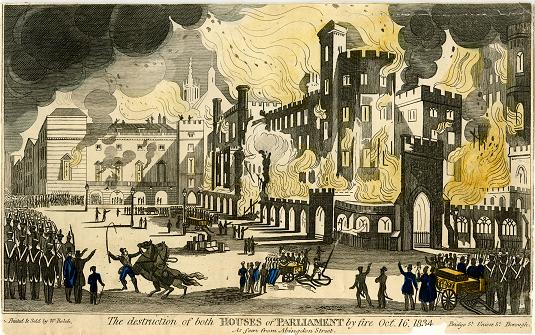

Sam Griffiths
Associate Professor in Spatial Cultures
The Bartlett School of Architecture, UCL
In a passage from his 1845 novel Sybil the future British Prime Minister Benjamin Disraeli (1804–1881) refers to the home of Britain’s Parliament in the Palace of Westminster as “those proud and passionate halls”. If this view seems at one with the romantic sensibility of the Victorians towards old buildings, it would be wrong to think that it extended to the ancient institution of Parliament itself, “that rapacious, violent and haughty body”, as Disraeli describes it. He concludes the passage with the rhetorical question “Could the voice of solace sound from such a quarter?” (p.302) The solace Disraeli seeks is from the social discord of utilitarian political economy, the urban-industrial creed in which he sees the traditional pastoral relationships of aristocratic society being replaced by the instrumental relationships of Thomas Carlyle’s “cash nexus”, characterized by the opposing interests of labour and capital.
Disraeli is sympathetic to Parliament only insofar as it fulfils what he regards as the institution’s proper role to defend the aristocratic ideal of the commonweal. His ‘Young England’ trilogy Coningsby (1844), Sybil (1845) and Trancred (1847) are set in the years immediately following the passing of the ‘Great’ Reform Act of 1832 that extended Parliamentary representation to the new industrial cities and the franchise to the urban middle class. The Act is typically (if misleadingly) represented as marking a decisive break with the aristocratic government of the English ancien regime, setting the country on the road to becoming a modern Parliamentary democracy. For Disraeli however, the reformed Parliament was not a source of solace but of faction and strife.
It is notable that the fire that consumed most of the medieval-Tudor Palace of Westminster in 1834, and which led ultimately to Barry and Pugin’s neo-gothic Parliament building – a rebuild that would have been underway for almost a decade by the time Disraeli was writing Coningsby ¬– does not merit even a passing mention in the Young England trilogy. For Disraeli the political locations that mattered most lay beyond the Parliament building, particularly the outdoor sites favoured by the working-class Chartist movement. The politics of the ancien regime itself had always taken place in the country houses and clubs frequented by the aristocracy. Indeed, Parliament itself was little more than a club with rules of membership that rapidly promoted boys with aristocratic patronage from the debating societies of Eton and Oxbridge to the Parliamentary stage.
It is not hard to find contemporary parallels. Kim Dovey (1999) has argued that Parliamentary debating chambers constructed to the Westminster template of two opposing sides facing off at “swordfighting distance” (p. 92), and with a clear hierarchy of front-bench to back-bench seating, help encode patriarchal, conservative tendencies on both sides of the political divide. While Disraeli would not have couched his arguments in terms of architectural design he would have recognized Dovey’s broader point that time-honoured Parliamentary rituals can become a hindrance to the practice of meaningful politics.
Yet if the arguments for Parliamentary reform in Disraeli’s time implied the expansion of the political nation, in contemporary Britain they coincide with the hollowing-out of the (middle-class) political nation. In the context of rapid globalization, Parliamentary buildings as grandiose symbols of nation-states occupying central locations in capital cities, can seem hopelessly anachronistic; ailing monuments to the bourgeois society that Disraeli so distrusted. And what of the ritualized practice most associated with these buildings, namely debates? Increasingly the political forum that matters is the ‘democratic’ virtual space of social media. On this platform the liberal celebration of debate – so far as this implies rational and critical scrutiny of political claims – loses its privilege to define what is, and what is not, politically acceptable argument. This paper explores the relationship of the Parliamentary buildings to political agency in the ‘Young England’ novels of Benjamin Disraeli and develops the comparison between the political juncture of 1832 in Britain and the current crisis of parliamentary legitimacy in which ‘voices of solace’ can seem suspect.